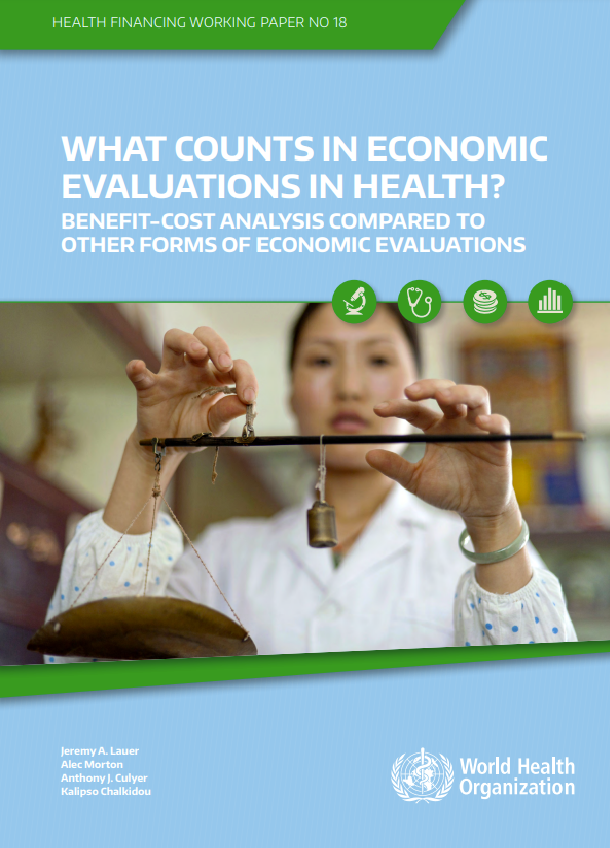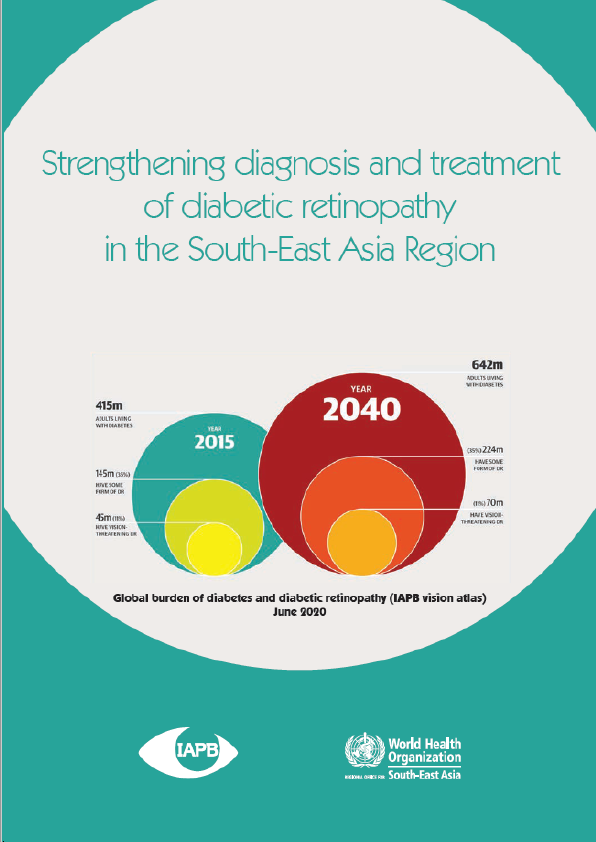Economic evaluations are increasingly popular, both in the field of global health as well as in purely domestic settings. However, the proliferation and use of economic evaluations by members of multiple publics, many of whom are non-economists, creates misunderstandings as well as strategic opportunities. In this extended essay, Lauer and colleagues develop a critical analysis of economic evaluations that is intended to clarify concepts and terms, and thereby to enable a diverse community of users, performers, and commissioners of economic analyses in health to better understand and use such studies. The authors pay particular attention to cost-effectiveness analysis, long the mainstay of economic evaluations in health, and to benefit-cost analysis. The article starts by noting that economic evaluations in health (EEHs) take a number of typical forms, although all involve a comparison of inputs and outcomes, either of which may or may not be market-traded goods. They call a particular choice of inputs and outcomes a ‘table of accounts’. They argue that the notion of a table of accounts provides a useful way to understand the methodological diversity of EEHs, one which subsumes more established but also more restrictive terminology (e.g. the notion of ‘study perspective’). Lauer and colleagues present tables of account for a number of commonly used EEHs. They then discuss at length benefit-cost analysis, a distinctive form of EEH that has recently attracted substantial attention in the form of so-called ‘investment cases’ in health.
Economic evaluations in health (EEHs) take many forms. However, they generally involve a comparison of inputs and outcomes, either of which may or may not be market-traded goods.
We call a particular choice of inputs and outcomes a ‘table of accounts’. We argue that the notion of a table of accounts provides a useful way to understand the methodological diversity of EEHs, which subsumes more established but also more restrictive terminology (e.g. the notion of ‘study perspective’).
Our concept of a table of accounts can also be thought of as a more structured and theoretically grounded instance of the currently popular notion of ‘value frameworks’. We present tables of account for a number of commonly used EEHs, then we discuss at length benefit-cost analysis (BCA), a distinctive form of EEH that has recently attracted substantial attention.
In addition to the table of accounts, a BCA also relies on a table of values: understanding the table of values is key to understanding both the appeal of BCA and also its vulnerabilities.
We conclude with reflections on when and for whom BCA may be an attractive form of analysis compared with other forms of EEH, such as cost-effectiveness analysis.
Improvements in medical technology and an aging global population mean that healthcare has a greater role in securing human wellbeing, and also a greater economic footprint, now than at any previous time in history. In many countries, as well as at the international level, those responsible for providing and paying for health services explicitly recognize that not all effective medical technologies and services are affordable. Decisions about whether to adopt technologies and services in publicly funded benefit packages, for example, typically involve balancing health gains against the other socially valuable uses to which the resources required could be put (opportunity cost). This is done increasingly explicitly, on the basis of analyses that build upwards from the biomedical evidence to create nested sets of information that support decision-makers in coming to judgments about value for money in health. Any such type of analysis is what we call an economic evaluation in health (EEH).
INTRODUCTION
Economic evaluations in health are related to the broader domains of planning, management, and evaluation science, which for our purposes explicitly include project evaluation, impact assessment for development (now usually called ‘theory of change’), results based management, but also – somewhat farther afield – realist evaluation. Except when distinctions are important, we loosely refer to these and related disciplines with the umbrella term ‘management science’. Evaluations in health share significant common points with management science and increasingly share a common terminology. Not surprisingly, economic evaluations have also been much influenced by the methods and theories of economics, and in particular by the work of two influential post-war women economists, Dorothy Rice and Selma Mushkin. The post-war context was important for economic evaluations for at least three reasons.
First, the war spurred technological and social advancement and, as a result, sharpened awareness of the need to plan, conduct and evaluate large-scale collective undertakings, such as warfare. In this sense, the roots of modern management science go back at least as far as the revolution in military theory and practice begun in 19th century Prussia through the work of career soldiers Carl von Clausewitz and Helmuth von Moltke who, drawing lessons from the Napoleonic Wars, formulated and tested new theories of war, of which modern management science happens to be a direct descendant. These writers introduced conceptual innovations that are still highly salient for management science: a distinction between levels of result (for example, outputs, outcomes and impact) and an explicit recognition of the role of uncertainty and feedback effects in the prosecution of complex plans.
The second reason is that the war coincided with a massive growth in the role of the state in the former warring countries and the concomitant expansion, in the West, of direct taxation (e.g. income taxes) as a primary means of financing public budgets. 2 HEALTH FINANCING WORKING PAPER NO 18 As a result, in the post-war period the public sector achieved a new prominence – one that had thitherto been inconceivable – in the lives of the citizens of these countries. These two features (the development of management science as an extension of the theory of war and an unprecedented expansion of the public sphere) together formed the basis of the modern, technocratic approach to public governance, within which management science remains a determining element.
The third reason is that the period immediately before, during, and after the Second World War corresponded with the entry of economics (and economists) for the first time in history into the highest spheres of public policy, as exemplified by the work and lives of John Maynard Keynes in the United Kingdom of Great Britain and Northern Ireland and John Kenneth Galbraith in the United States of America. Ever since, and regardless of the political allegiances of influential economists, economics has maintained a dominant role in public policy and administration, explaining in part the overwhelming importance of economic ideas and theories within management science. In other words, since the post-war period both the objectives and results of collective social undertakings, public and private, have generally and wherever possible been conceptualized, measured and evaluated in economic terms.











